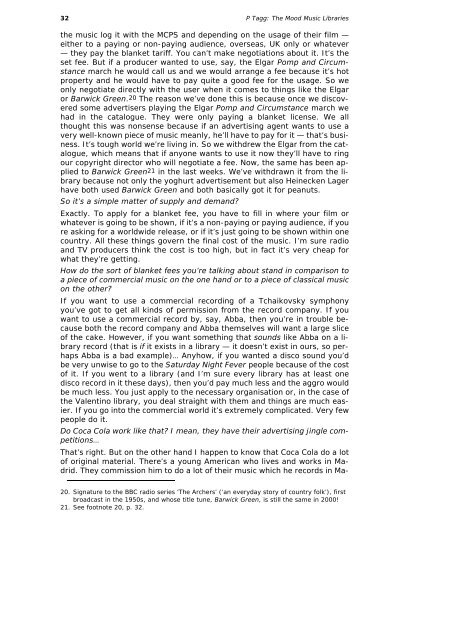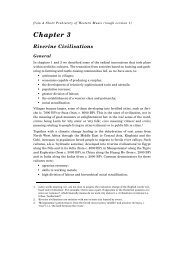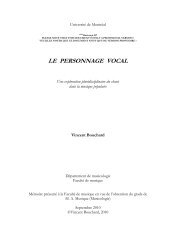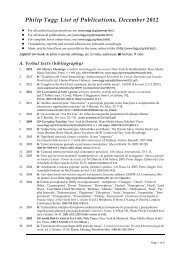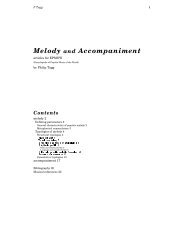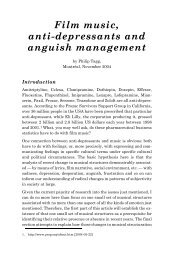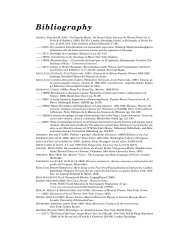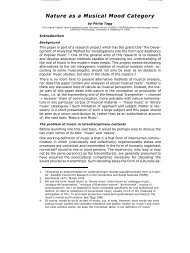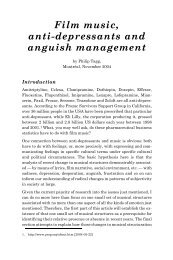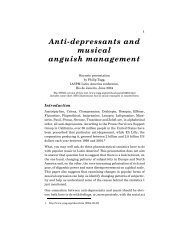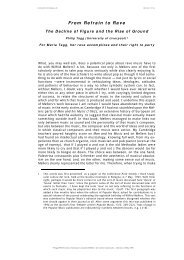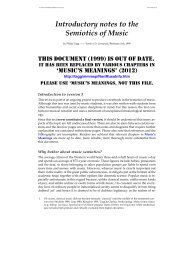interviews with library music producers - Philip Tagg
interviews with library music producers - Philip Tagg
interviews with library music producers - Philip Tagg
Create successful ePaper yourself
Turn your PDF publications into a flip-book with our unique Google optimized e-Paper software.
32 P <strong>Tagg</strong>: The Mood Music Libraries<br />
the <strong>music</strong> log it <strong>with</strong> the MCPS and depending on the usage of their film —<br />
either to a paying or non-paying audience, overseas, UK only or whatever<br />
— they pay the blanket tariff. You can’t make negotiations about it. It’s the<br />
set fee. But if a producer wanted to use, say, the Elgar Pomp and Circumstance<br />
march he would call us and we would arrange a fee because it’s hot<br />
property and he would have to pay quite a good fee for the usage. So we<br />
only negotiate directly <strong>with</strong> the user when it comes to things like the Elgar<br />
or Barwick Green.20 The reason we’ve done this is because once we discovered<br />
some advertisers playing the Elgar Pomp and Circumstance march we<br />
had in the catalogue. They were only paying a blanket license. We all<br />
thought this was nonsense because if an advertising agent wants to use a<br />
very well-known piece of <strong>music</strong> meanly, he’ll have to pay for it — that’s business.<br />
It’s tough world we’re living in. So we <strong>with</strong>drew the Elgar from the catalogue,<br />
which means that if anyone wants to use it now they’ll have to ring<br />
our copyright director who will negotiate a fee. Now, the same has been applied<br />
to Barwick Green21 in the last weeks. We’ve <strong>with</strong>drawn it from the <strong>library</strong><br />
because not only the yoghurt advertisement but also Heinecken Lager<br />
have both used Barwick Green and both basically got it for peanuts.<br />
So it’s a simple matter of supply and demand?<br />
Exactly. To apply for a blanket fee, you have to fill in where your film or<br />
whatever is going to be shown, if it’s a non-paying or paying audience, if you<br />
re asking for a worldwide release, or if it’s just going to be shown <strong>with</strong>in one<br />
country. All these things govern the final cost of the <strong>music</strong>. I’m sure radio<br />
and TV <strong>producers</strong> think the cost is too high, but in fact it’s very cheap for<br />
what they’re getting.<br />
How do the sort of blanket fees you’re talking about stand in comparison to<br />
a piece of commercial <strong>music</strong> on the one hand or to a piece of classical <strong>music</strong><br />
on the other?<br />
If you want to use a commercial recording of a Tchaikovsky symphony<br />
you’ve got to get all kinds of permission from the record company. If you<br />
want to use a commercial record by, say, Abba, then you’re in trouble because<br />
both the record company and Abba themselves will want a large slice<br />
of the cake. However, if you want something that sounds like Abba on a <strong>library</strong><br />
record (that is if it exists in a <strong>library</strong> — it doesn’t exist in ours, so perhaps<br />
Abba is a bad example)… Anyhow, if you wanted a disco sound you’d<br />
be very unwise to go to the Saturday Night Fever people because of the cost<br />
of it. If you went to a <strong>library</strong> (and I’m sure every <strong>library</strong> has at least one<br />
disco record in it these days), then you’d pay much less and the aggro would<br />
be much less. You just apply to the necessary organisation or, in the case of<br />
the Valentino <strong>library</strong>, you deal straight <strong>with</strong> them and things are much easier.<br />
If you go into the commercial world it’s extremely complicated. Very few<br />
people do it.<br />
Do Coca Cola work like that? I mean, they have their advertising jingle competitions…<br />
That’s right. But on the other hand I happen to know that Coca Cola do a lot<br />
of original material. There’s a young American who lives and works in Madrid.<br />
They commission him to do a lot of their <strong>music</strong> which he records in Ma-<br />
20. Signature to the BBC radio series ‘The Archers’ (‘an everyday story of country folk’), first<br />
broadcast in the 1950s, and whose title tune, Barwick Green, is still the same in 2000!<br />
21. See footnote 20, p. 32.


